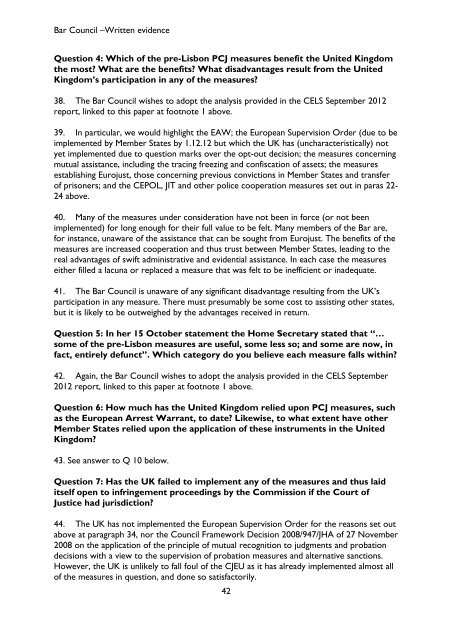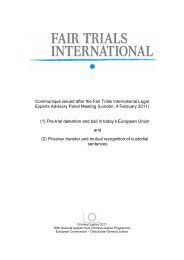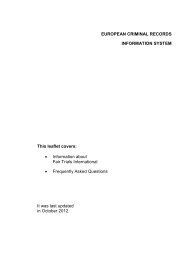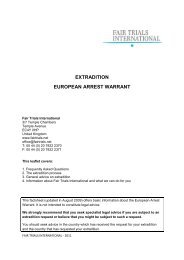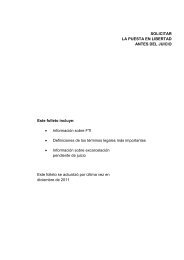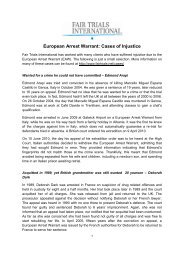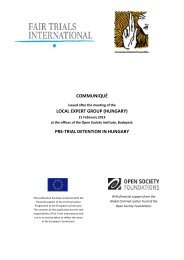The Association of Chief Police Officers - Parliament
The Association of Chief Police Officers - Parliament
The Association of Chief Police Officers - Parliament
You also want an ePaper? Increase the reach of your titles
YUMPU automatically turns print PDFs into web optimized ePapers that Google loves.
Bar Council –Written evidenceQuestion 4: Which <strong>of</strong> the pre-Lisbon PCJ measures benefit the United Kingdomthe most? What are the benefits? What disadvantages result from the UnitedKingdom’s participation in any <strong>of</strong> the measures?38. <strong>The</strong> Bar Council wishes to adopt the analysis provided in the CELS September 2012report, linked to this paper at footnote 1 above.39. In particular, we would highlight the EAW; the European Supervision Order (due to beimplemented by Member States by 1.12.12 but which the UK has (uncharacteristically) notyet implemented due to question marks over the opt-out decision; the measures concerningmutual assistance, including the tracing freezing and confiscation <strong>of</strong> assets; the measuresestablishing Eurojust, those concerning previous convictions in Member States and transfer<strong>of</strong> prisoners; and the CEPOL, JIT and other police cooperation measures set out in paras 22-24 above.40. Many <strong>of</strong> the measures under consideration have not been in force (or not beenimplemented) for long enough for their full value to be felt. Many members <strong>of</strong> the Bar are,for instance, unaware <strong>of</strong> the assistance that can be sought from Eurojust. <strong>The</strong> benefits <strong>of</strong> themeasures are increased cooperation and thus trust between Member States, leading to thereal advantages <strong>of</strong> swift administrative and evidential assistance. In each case the measureseither filled a lacuna or replaced a measure that was felt to be inefficient or inadequate.41. <strong>The</strong> Bar Council is unaware <strong>of</strong> any significant disadvantage resulting from the UK’sparticipation in any measure. <strong>The</strong>re must presumably be some cost to assisting other states,but it is likely to be outweighed by the advantages received in return.Question 5: In her 15 October statement the Home Secretary stated that “…some <strong>of</strong> the pre-Lisbon measures are useful, some less so; and some are now, infact, entirely defunct”. Which category do you believe each measure falls within?42. Again, the Bar Council wishes to adopt the analysis provided in the CELS September2012 report, linked to this paper at footnote 1 above.Question 6: How much has the United Kingdom relied upon PCJ measures, suchas the European Arrest Warrant, to date? Likewise, to what extent have otherMember States relied upon the application <strong>of</strong> these instruments in the UnitedKingdom?43. See answer to Q 10 below.Question 7: Has the UK failed to implement any <strong>of</strong> the measures and thus laiditself open to infringement proceedings by the Commission if the Court <strong>of</strong>Justice had jurisdiction?44. <strong>The</strong> UK has not implemented the European Supervision Order for the reasons set outabove at paragraph 34, nor the Council Framework Decision 2008/947/JHA <strong>of</strong> 27 November2008 on the application <strong>of</strong> the principle <strong>of</strong> mutual recognition to judgments and probationdecisions with a view to the supervision <strong>of</strong> probation measures and alternative sanctions.However, the UK is unlikely to fall foul <strong>of</strong> the CJEU as it has already implemented almost all<strong>of</strong> the measures in question, and done so satisfactorily.42


